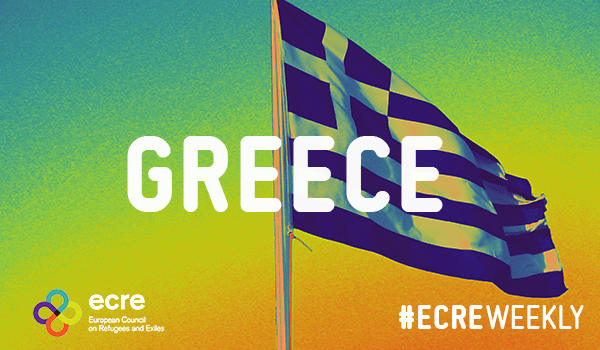Amid mounting evidence of systematic push-backs from Greece, Shipping Minister Ioannis Plakiotakis states that 10,000 people have been prevented access in 2020. Greek authorities have extended the lockdown of all structures hosting refugees and migrants until 15 September. The first instance recognition rate rises to 69% according to Eurostat.
Minister Plakiotakis with Greek coast guard under his mandate stated at a news conference on 2 September that arrivals had decreased 84 per cent since 1 March, compared to the same period of 2019, and that the drop in the month of August was 95 per cent compared to August 2019. According to Plakiotakis 10,000 people have been prevented from accessing Greece in 2020 so far but the Minister refused to elaborate on how this had been achieved, stating simply that the Greek coast guard: “operates based on international law and international legality, based on the rules of engagement at sea, and … with complete respect for human dignity and of course for human life”.
Greek Helsinki Monitor has filed a criminal complaint to the High Court Prosecutor concerning the push back of 1389 people by Greek Coastguard based on evidence from numerous sources including leading international media, IOM, UNHCR, the hotline Alarmphone, Human Rights Watch, Legal Centre Lesvos and Border Violence Monitoring Network (BVMN), who in a press release expresses increasing concern about: “the disappearance and pushbacks of refugees and migrants from humanitarian distribution sites, refugee camps and pre-removal centres in Greece. The illegal pushback and disappearance of refugees and migrants is systematically followed by the statewide dismissal of credible evidence and the perpetual refusal to open a free and fair investigation into the whereabouts of the missing”.
Following a joint decision by the Ministers of Civil Protection, Health and Immigration and Asylum the lockdown of all structures hosting refugees and migrants has been extended to 15 September. The lockdown, presented as a COVID-19 measure, has been in place since 21 March. The Ministry of Asylum and Migration further announced another round of closures of hotel accommodation facilities for asylum seekers, in Kozani, Edessa, Prespes and Grevena.
A man recently returned from Athens has tested positive for COVID-19 in the overcrowded Moria camp on Lesbos hosting around 13,000 people under dire, unsanitary conditions. As a reaction the Ministers of Citizen Protection, Health and Immigration and Asylum, has placed the Reception and Identification Center in Moria in complete health exclusion (quarantine) for a total of 14 days. Since March people arriving to Greek island camps are quarantined to prevent the spread of COVID-19 and authorities have advised the residents to wear masks, practise social distancing, wash their hands, disinfect, and self-isolate if they feel unwell. However, according to a representative of Médecins Sans Frontières (MSF) such measures are “totally unrealistic in Moria,” and “Even if people spend as much time as possible in their tents, they still eat three times a day with thousands of other people. The same goes for the restrooms and showers. It is impossible to avoid the masses.” NGOs have consistently warned of the risks of an outbreak in the Moria camp.
According to Eurostat figures, over two thirds of first instance decisions (69%) taken by the Greek Asylum Service in 2020 granted international protection. Refugee Support Aegean (RSA) highlights that the figures dispel government statements to the contrary and point to a steady and significant increase in the population of beneficiaries of international protection in Greece, who face severe obstacles to access rights due to the absence of a holistic plan to enable their integration in the country.
Following relocations to several member states over the summer, 22 unaccompanied children have arrived in Finland with another 28 expected to follow under a Commission scheme originally targeting the relocation of 1600 unaccompanied and vulnerable children.
For further information:
- ECRE, Greece: Border Fence Extension, Denial of Push-backs, Anti-migrant Violence, Continued Destitution, Drop in Protection Rate, August 2020
- ECRE, Greece: No Accountability for Deadly Shooting, Continued Push-backs and Evictions, Critique of Crack-down on NGOs, German States Willing to Relocate, July 2020
- ECRE, Greece: Camp Lockdown Extended, Children in Detention, Cuts in Housing, Red-tape on NGOs and Continued Push-backs, June 2020
- AIDA, 2019 Update Greece, June 2020
- ECRE, Greece: Pushbacks Continue, Eviction of Makeshift Camp in Athens, June 2020
- ECRE, Greece: 500 to Escape Greece – Thousands Facing Destitution, Detention and Push-backs, June 2020
- AIDA, Housing out of reach, May 2019
- ECRE, Greece: France to Relocate 750 People, Government Deny Responsibility for Deadly Border Shooting, Lock-down Extended, and Violations Continue, May 2020
- ECRE, Greece: Chaotic Resumption of Procedures, Hundreds of Children Detained, Crack-Down on NGOs, New Evidence of Push-backs to Turkey, May 2020
- ECRE, Greece: New Relocations the only Positive Development amid Continued Violations, May 2020
- ECRE, Greece: Deadly Shot Fired from Greece, Continued Push-backs, Transfers to Mainland Met with Attacks, Parliament Votes on New Controversial Bill, May 2020
- ECRE, Greece: Fires in Samos Camp, Evacuations on Hold, European Cities Offer Relocation, April 2020
- ECRE, Greece: Unrest Amid Intensifying Corona Threat, ECtHR Orders Measures for Vulnerable Groups, April 2020
- ECRE, Greece: 1000 Vulnerable People Evacuated, Relocation of Children Started, Asylum Procedures Suspended, Renewed Tensions at Turkish Border, April 2020
- ECRE, Greece: Still no Access to Asylum, Second Camp Quarantined, First Relocations Ahead, Push Backs to Turkey, April 2020
- ECRE, Greece: Parliament Ratifies Emergency Decree Amid Intensifying Critique, March 2020
- ECRE, Greece: Fire and Virus Fear in Moria, 450 People Detained on Vessel Moved to Closed Camp, March 2020
- ECRE, Violations Continue in Greece, EU Says Asylum Procedures Cannot be Suspended, March 2020
- Organisations in Greece, Joint Statement: “Protect our laws and humanity!”, March 2020
- ECRE, Weekly Editorial: EU is Crossing the Red Line by Preventing Refugees from Crossing its Borders, March 2020
This article appeared in the ECRE Weekly Bulletin . You can subscribe to the Weekly Bulletin here.

